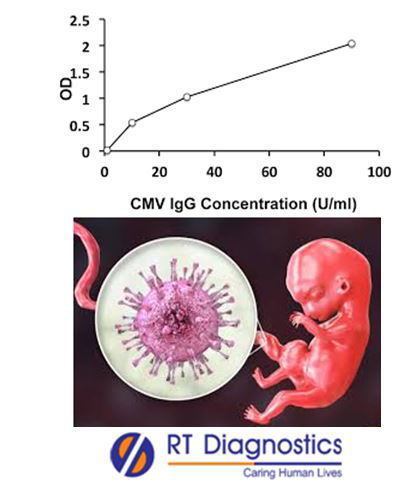CMV IgG:
Why CMV IgG Test?
CLINICAL INFORMATION
CMV is a virus that belongs to the herpes family and hence like other herpes infections CMV can cause latent manifestations (recurrence). It usually affects young adults (adolescent age group) and/or children. Usually, the primary infection (exposure) resolves by itself – mostly Self-Limiting. The virus can infect by handling or exchanging body fluids such as saliva, blood, urine, breast milk, semen, etc. In pregnant women, CMV infection (the most common congenitally acquired virus that affects the developing fetus and the newborns) can cause serious harm to the developing fetus and can manifest in immune-compromised patients such as HIV/AIDS, with a weak immune system. CMV usually remains silent (asymptomatic) or mild symptoms, but it can also manifest with some signs and symptoms (clinical manifestations) such as prolonged fever, fatigue, loss of appetite, muscle, and joint pain, stiffness, headache, sore throat, swollen lymph nodes, swollen liver and spleen, eye infection (inflammation of the retina), GI manifestations – diarrhea & abdominal pain, Respiratory manifestations – pneumonia with non-productive cough and shortness of breath, CNS – encephalitis, immune system depression leading to secondary infections eg. Fungal infections, complications in pregnancy eg. abortions, stillbirth, etc. while in newborn it manifests with manifestations such as anemia, jaundice, seizures, developmental problems and/or with congenital abnormalities – born with birth defects such as a baby born with a small head, dwarfism, disproportionate body growth, etc. CMV being an opportunist infection is more likely to coexist along with certain pathologies such as pneumonia, hepatitis, GI diseases/disorders, etc. CMV Antibody Test looks for screening and/or confirmation of CMV (antigen) or CMV antibodies in the blood (or other body fluids like CSF, saliva, urine, blood, and or tissue biopsies). This test is mandatory in certain cases such as pregnancy (antenatal diagnosis for TORCH infection – which includes Cytomegalovirus), transplants (donor and/or recipient), patients with pre-exposure to CMV with signs of latent infection, suppressed (patients on immune-suppressive drugs) or immune-compromised patients with the weak immune system, etc. CMV Antibody IgG Test – IgG antibodies are produced several weeks after the initial CMV infection. The IgG levels rise during active infection and stabilize as the infection resolves or when the virus becomes dormant. Other tests include complete blood count (CBC), detection of antigen and/or antibodies by ELISA, PCR techniques, blotting methods, histopathological studies for confirmation, mononucleosis, or Epstein-Barr virus test, etc.

General Instructions:
Sample Requirement: Specimen - Blood sample collected from the vein. Test Preparation: None.
NOTE - Sample for specimen collections may vary based on the patient’s condition/cases according to the patient’s presenting complaints/signs or symptoms:
SPECIMEN REQUIREMENT (Special or Rare Cases) - As instructed and guided by Physician / Clinician / Pathologist / as per Laboratory’s requirements, according to procedures and protocols.
Sample Requirement: Blood Sample taken from the vein
Test Preparation: None
This Multi-Specialty Clinical Referral Laboratory RT DIAGNOSTICS provides precise and accurate tests with an extensive range of testing services to the medical centers to help in the diagnosis and identification of pathology in the test specimens for infectious diseases and also to evaluate the function of organ systems of the patient. It prevents further complications and helps to stabilize and restore health to near normalcy at the earliest without delay.



